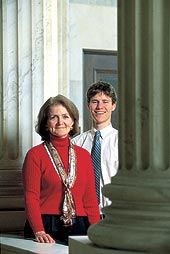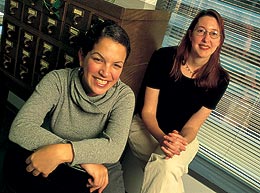 |
Experience,
Exposure, & Enlightenment
Student
interns have a capital good time with D.C. alums
by
Alex Parker '04
photos
by Scott Suchman
JANUARY
3, DAY ONE: I was off and running through Capitol Hill to
cover a breaking news story. The House Republican leadership
was electing committee chairs, and journalist Mike Doyle
'78 and I were tracking a Californian slated to head the
powerful House Ways and Means Committee. Lesson one, says
Doyle, was always to use the word powerful when writing
the phrase "House Ways and Means Committee." The leaders
kept pushing back the meeting: from noon to three to five,
prompting Doyle to quote columnist Russell Baker: "Reporting
in Washington often consists of waiting in marble halls
for five hours so someone can come out and lie to you."
A
Washington, D.C., correspondent for McClatchy Newspapers,
Doyle was among 40 alumni who sponsored student internships
during January's winter term. Due in part to the hiring
last year of Kimberly Betz, the Longman director of internships,
Oberlin's Office of Career Services (OCS) has developed
a structured process to link students with alums who can
offer meaningful, academically based, off-campus work experiences.
"Alumni, traditionally, are very supportive of winter term,"
Betz says. "It's a chance for students to take academics
and activism out of the ivory tower and into the world."OCS
solicited internships in a variety of fields across the
country--the Cleveland Museum of Art, Pathways to Housing
in New York, a water engineering company in Boulder--but
emphasized D.C., where regional alumni support is strong
and where hands-on work in government, grass-roots, and
policy-shaping offices abounds.
 Take
David Persky '02, who got right to work tracking laundered
money and international crooks withthe Senate Permanent
Subcommittee on Investigations. Headed by Michigan Democrat
Carl Levin, the subcommittee scrutinizes organized crime,
labor management, racketeering, gambling, and money laundering
involving U.S. banks and securities firms. "This is a terrific
opportunity for college students to see how their federal
government operates," says Linda Gustitus '69, long-time
chief counsel to Levin and initiator of the internship. Take
David Persky '02, who got right to work tracking laundered
money and international crooks withthe Senate Permanent
Subcommittee on Investigations. Headed by Michigan Democrat
Carl Levin, the subcommittee scrutinizes organized crime,
labor management, racketeering, gambling, and money laundering
involving U.S. banks and securities firms. "This is a terrific
opportunity for college students to see how their federal
government operates," says Linda Gustitus '69, long-time
chief counsel to Levin and initiator of the internship.
Persky,
a double-degree student majoring in law and society and
voice performance, focused chiefly on international finance,
helping prosecutors compile information for congressional
reports. "We uncovered a lot of bank laundering that
people will see when the report is published by the Senate,"
says Persky, who was asked by his office not to reveal
specifics. "There is truth to the stereotype that Swiss
banks are corrupt."
Persky
also worked for the senator's personal office, helping
Levin's press
office interpret changes in law and policy and
adjust what they present
to the media. In other words, spin control. He
prepared news
paper
clips and sat in with spin-doctors as they worked their
magic. The experience was inspiring.
"I'm
more driven," he says. "As one individual, I'm capable
of making active change using my education to promote
something I believe in. The Republican Party is not--as
I had thought before--a vindictive, money-hungry group
of individuals just vying for power for power's sake.
There really are legitimate issues being raised by people
who have been socialized differently than I have been."
Still,
Persky is an unabashed liberal who hopes to have a career
in international affairs that may or may not involve
politics.
From
its tenth-floor office on DuPont Circle, Environmental
Defense might be mistaken for a law firm. A large meeting
room encased with glass doors lies behind the receptionist,
and rows of offices extend in all directions. It's homey,
but has the air of professionalism one associates with
a high-powered business.
With
its alliance of attorneys, scientists, and lobbyists,
Environmental Defense makes strong efforts to push eco-friendly
legislation through Congress. Rather than shouting and
denouncing, staff members stay focused on results and
innovative problem solving. Consider the group's slogan:
"Finding the ways that work."
"I
have a lot of respect for this approach," says Lindsey
Dillon '03, a double major in politics and law and society
who interned with attorney Karen Florini '79. "They
don't specifically lobby for this or that."
The
advocacy group represents more than 300,000 members,
and, since 1967, has linked science, economics, and
law to address the most urgent environmental problems.
Dillon's project focused on antibiotic resistance. Environmental
Defense contends that the overuse of antibiotics, both
in medicine and industrial agriculture, has precipitated
new strains of resistant bacteria that are becoming
immune to treatment. As a researcher and analyst, her
job wasn't easy. Often holes in data and important facts
were concealed under corporate proprietorship.
"The
really useful information--what exactly each chicken
farm or company uses--is kept hidden under proprietary
rights. Companies don't legally have to reveal the
information, so they don't."
"Lindsey
had a chance to see interactions between different
advocacy groups," Florini says. "She learned that
when you see an issue that's scientifically and politically
complex, you have to look at different sides to find
an approach that works."
 Also
boosting the advocacy effort was Sarah Meyer '02,
whose internship with Jobs with Justice involved mobilizing
local unions and religious organizations. The 13-year-old
national coalition of unions and civil-rights groups
fights to defend and expand workers' rights. "I wanted
to know what it was like to work in an office," says
Meyer, who, from an eight-story suite, felt a bit
removed from her former field work with Union Central
and the United Food and Commercial Workers International
Union. Also
boosting the advocacy effort was Sarah Meyer '02,
whose internship with Jobs with Justice involved mobilizing
local unions and religious organizations. The 13-year-old
national coalition of unions and civil-rights groups
fights to defend and expand workers' rights. "I wanted
to know what it was like to work in an office," says
Meyer, who, from an eight-story suite, felt a bit
removed from her former field work with Union Central
and the United Food and Commercial Workers International
Union.
Internship
sponsor Kris Raab '89 is a research economist with
Communication Workers of America, a labor union that
helped
create Jobs with Justice in 1987. Now facing a Republican
White House and Congress, she says she anticipates
a wave of anti-union measures, among them the weakening
of worker-safety restrictions and "paycheck protection"
that would require membership consent for unions to
use money for political purposes "The very idea is
offensive to us," Raab says. "We call it paycheck
deception."
Among
Meyer's projects was the creation of a database of
student newspapers, which will be used in coordination
with student labor groups. I asked Meyer why she became
involved with the labor movement. "Bad jobs," she
briefly replied. "These people shouldn't be treated
the way they are."
go
to page | 1 | 2 | of
Experience, Exposure, & Entertainment
|

